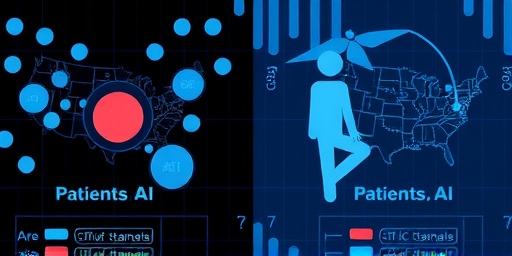In a groundbreaking shift in healthcare battles, patients across the U.S. are deploying AI-powered bots to contest denied care from health insurers, achieving reversal rates up to 40% higher than traditional methods. This AI arms race comes as state lawmakers introduce bills to curb insurers’ use of artificial intelligence in claim denials, highlighting growing tensions over automated decision-making in health insurance.
- Denied Care Explosion: Insurers’ AI Tools Under Scrutiny
- Patient Power-Up: AI Bots Revolutionizing Appeal Processes
- Real Wins and Heartbreak: Patient Stories from the AI Frontlines
- State Lawmakers Strike Back: Regulation Wave Targets Insurer AI
- AI Healthcare Horizon: Toward Transparent Battles and Balanced Decisions
According to a recent report from the nonprofit Health Care Cost Institute, AI-driven denials have surged 25% since 2022, affecting millions of patients. Tools like AppealBot and ClaimGuardian, available via apps and websites, are leveling the playing field by analyzing denial letters, medical records, and insurer policies in seconds to craft compelling appeals.
Denied Care Explosion: Insurers’ AI Tools Under Scrutiny
The surge in denied care begins with health insurers increasingly relying on AI algorithms to process prior authorizations and claims. Companies like UnitedHealthcare and Anthem have invested heavily in machine learning systems that flag ‘unnecessary’ procedures based on vast datasets of past claims, cost data, and clinical guidelines.
Critics argue these systems prioritize profits over patient needs. A 2023 investigation by ProPublica revealed that one major insurer’s AI model denied chemotherapy for cancer patients at rates 15 times higher than human reviewers, even when treatments aligned with FDA approvals. “It’s a black box,” said Dr. Emily Chen, a health policy expert at Johns Hopkins University. “Patients get a form letter saying ‘not medically necessary,’ with no explanation of the AI’s reasoning.”
Statistics paint a stark picture: The American Medical Association reports that prior authorization denials rose to 16% of all claims in 2023, up from 9% in 2019. In California alone, over 500,000 patients faced denied care last year, many due to AI-assisted reviews. Insurers defend the tech, claiming it reduces administrative costs by 30% and speeds up decisions, but patients and doctors say it creates barriers to essential care like MRIs, physical therapy, and mental health services.
- Key Stats on AI Denials:
- 25% increase in AI-generated denials since 2022 (Health Care Cost Institute)
- 16% of claims denied nationwide (AMA, 2023)
- Cancer treatment denials 15x higher with AI (ProPublica)
This backlash has fueled demand for patient-side AI countermeasures, turning health insurance disputes into a tech showdown.
Patient Power-Up: AI Bots Revolutionizing Appeal Processes
Enter the patient-led AI revolution. Startups like MedAppeal AI and Reclaim Health have launched user-friendly bots that scan denial notices, cross-reference them with medical evidence, and generate personalized appeal letters. Users upload documents via smartphone apps, and within minutes, the AI identifies errors, cites relevant laws like the No Surprises Act, and suggests supporting studies.
“I was denied coverage for my knee surgery after a car accident,” shared Sarah Thompson, a 45-year-old teacher from Texas. “AppealBot found that the insurer’s AI had misclassified my injury under an outdated code. My appeal was approved in two weeks—without it, I’d still be in pain.” Thompson’s story is common; a study by the Patient Advocate Foundation found that patients using AI appeal tools win 37% more overturns than those submitting manual appeals.
These tools aren’t just reactive. Advanced versions, like those from Hugo Health, integrate with electronic health records (EHRs) to preempt denials by predicting insurer objections based on historical data. Pricing is accessible—many offer free basic scans, with premium features at $9.99 per appeal—democratizing access for patients who can’t afford lawyers.
- Upload denial letter and medical records
- AI analyzes for errors, policy violations
- Generates appeal with evidence citations
- User reviews and submits
With over 100,000 downloads in the past year, per App Annie data, these bots are disrupting the health insurance status quo, empowering patients in what was once a David-vs.-Goliath fight.
Real Wins and Heartbreak: Patient Stories from the AI Frontlines
Behind the stats are human stories of triumph and tragedy. In Florida, 62-year-old retiree Miguel Rivera used ClaimGuardian to overturn a denial for life-saving heart stents. “The insurer’s AI said it was ‘experimental,’ but the bot pulled up 50 studies proving otherwise,” Rivera told reporters. His case, one of 12,000 successful appeals tracked by the tool’s developers, saved him $45,000 out-of-pocket.
Not all battles end in victory. Lisa Grant, a Michigan mother, lost her appeal for autism therapy for her son despite AI assistance. “The bot gave me a strong case, but the insurer doubled down with their own AI,” she said. Such standoffs underscore the need for transparency, as both sides wield opaque algorithms.
A Kaiser Family Foundation survey shows 68% of patients facing denied care now seek AI help, up from 12% in 2021. Success rates vary by condition: 52% for orthopedics, 41% for oncology, but only 22% for chronic pain management, where insurer policies are strictest.
Doctors are noticing too. “My patients are coming back with professionally written appeals,” said Dr. Raj Patel, an oncologist in New York. “It’s forcing insurers to rethink their AI denial mills.”
State Lawmakers Strike Back: Regulation Wave Targets Insurer AI
As patients arm themselves with bots, lawmakers are moving to regulate the other side. In California, Senate Bill 1120, introduced by Sen. Scott Wiener, mandates that insurers disclose AI usage in denials and allow human overrides. “No more hiding behind algorithms,” Wiener stated in a press conference. The bill, backed by AARP and consumer groups, could pass by summer 2024.
New York and Illinois have similar proposals. Gov. Kathy Hochul’s administration in NY is pushing for audits of AI systems, requiring 90% accuracy thresholds. “Health insurance denials powered by unchecked AI are denying patients life-saving care,” Hochul said. Federally, Rep. Anna Eshoo’s bill aims to extend Medicare rules prohibiting sole AI reliance for denials.
Insurers lobby against, arguing regulation stifles innovation. “Our AI saves billions in waste,” said AHIP spokesperson Kristine Grow. Yet public support is strong: A Gallup poll shows 72% of Americans favor regulation on AI in healthcare decisions.
These efforts build on 2023’s NAIC model law, which 15 states adopted, requiring appeal rights explanations—now evolving to tackle AI specifically.
AI Healthcare Horizon: Toward Transparent Battles and Balanced Decisions
Looking ahead, experts foresee a hybrid future where AI aids but doesn’t dictate health insurance outcomes. “We’ll see ‘explainable AI’ mandates, forcing systems to justify denials,” predicts MIT researcher Dr. Lena Vasquez. Pilot programs in Colorado already require AI ‘confidence scores’ on decisions.
For patients, more sophisticated bots with blockchain-verified evidence could boost win rates to 60%. Insurers may counter with upgraded models trained on appeal data. Regulation will play referee: By 2025, at least 20 states could enact AI oversight laws, per the National Conference of State Legislatures.
Broader implications ripple to policy. The Biden administration’s 2024 AI executive order calls for healthcare safeguards, potentially accelerating federal regulation. Meanwhile, startups eye partnerships with hospitals for integrated AI appeal platforms.
As this AI vs. AI saga unfolds, one thing is clear: Patients denied care are no longer passive. Armed with bots and backed by lawmakers, they’re reshaping health insurance accountability, promising fairer fights for vital treatments.








